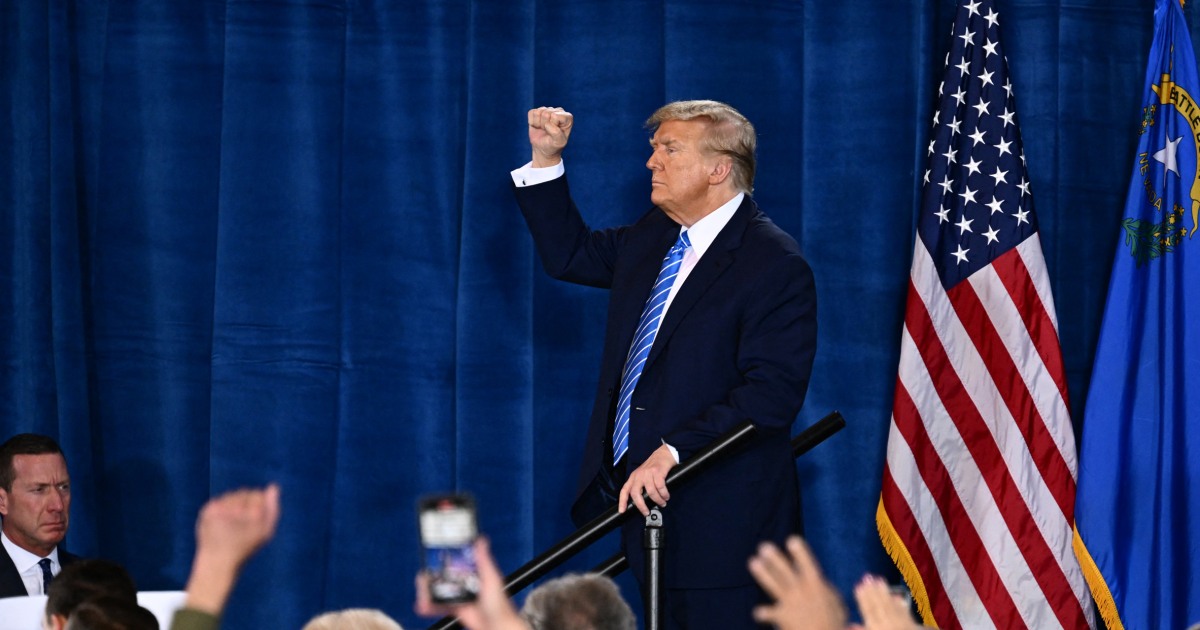
Nevada is typically a major, hard-fought stop on the path to the Republican presidential nomination — except this year, the fight is off.
Nevada Republicans are holding caucuses on Thursday, which will be used to allocate delegates to the national convention, and former President Donald Trump is running virtually unopposed.
His top GOP opponent, former U.N. Ambassador Nikki Haley, didn’t put her name on the caucus ballot. She’s instead participating in Tuesday’s state-run primary, which is mandated under state law but has no delegates at stake. (President Joe Biden is on the ballot for the Democratic Party’s primary, which is the party’s official contest in the state.)
Here’s a quick rundown of how both the primary and the caucuses work, why the split exists, and why Nevadans won’t see Trump and Haley on the same ballot.
When are the nominating contests in Nevada?
The caucuses will take place on Thursday, almost entirely from 8 p.m. to 10:30 p.m. ET (5 p.m. to 7:30 p.m. local). A small part of Nevada is on Mountain Time, which is an hour earlier than the rest of the state.
The official state presidential preference primary for both parties will be held Tuesday.
What’s the difference between the primary and the caucuses?
Amid the national Democratic Party’s attempts to reorganize the presidential nominating calendar after the 2020 election, Nevada enacted a law in 2021 that required the state to hold “a presidential preference primary” if multiple candidates file. The primary must be held the first Tuesday of February and be run by the state.
The law, which was passed by a Democratic-controlled Legislature and signed by the then-Democratic governor, was in part an attempt to secure the state’s spot at the front of the 2024 presidential nominating calendar. And it came as Democrats were looking to move away from caucuses like those both parties had long used in Nevada, de-emphasizing those contests in favor of higher-turnout primaries.
But the state GOP pushed back and is holding caucuses. From the point of view of the national Republican Party, that is the only recognized contest for the purpose of awarding delegates.
How are the major candidates handling the split?
Both the GOP caucuses and primary are effectively unopposed, and Biden faces little competition on the Democratic side.
On the GOP side, Trump is the only major candidate competing in the caucuses (the only other candidate competing is pastor Ryan Binkley). And Haley is the only major candidate on the state-run primary ballot — which, again, makes her ineligible to win delegates in the state.
On the Democratic side, Nevada is hosting the second party-sanctioned primary, after South Carolina held its contest on Saturday. Biden is on the ballot in Nevada, and his most prominent Democratic opponent will be Marianne Williamson. Rep. Dean Phillips, of Minnesota, filed his bid after Nevada’s deadline to get on the ballot.
Can Republicans vote in both the primary and the caucuses?
Yes, to a degree. The state-run primary is open to registered Republican voters and those who register on primary day as Republicans. Since the GOP caucuses are not governed by state law, there’s no prohibition against voting in both, as long as a voter registers as a Republican.
However, the state GOP announced a Jan. 9 deadline for voters to change their registration to Republican in order to participate in the caucuses. Anyone who changes their party affiliation after that date is not eligible to vote in the caucuses.
What has turnout looked like in the past?
It’s difficult to set expectations for turnout this year, not only because of the split system and the virtually unopposed contests, but because Nevada hasn’t had presidential primaries in the recent past.
Democratic turnout in recent history peaked in 2008, when approximately 118,000 participated in the caucuses, according to the state party, slightly better than the almost 105,000 that turned out for in 2020.
Republicans’ recent high water mark came in 2016, with more than 75,000 turning out.
Where does it all happen?
For the GOP caucuses, the party says there are about 1,528 precinct caucuses. Many of them take place within the same larger caucus site, according to a list published by the state party. For example, the Casino Fandango in Carson City is home to 12 different precinct caucuses.
There are about 135 separate caucus sites throughout the state.
Voters have to head to their specific precinct and bring government-issued ID to cast their caucus vote. There is no absentee option except for voters in the military and people with disabilities who need that accommodation.
The state-run primary will take place at early-voting sites, as well as by mail, since Nevada mails ballots out to all registered voters. Voters can either return their ballots by mail, drop them off in drop-boxes or vote in person either early or on Election Day.
What about early voting?
The early-voting rules are different for the GOP caucuses than they are for the state-run primary.
The GOP caucuses do not have early voting — only the absentee option listed in the section above. For those who are not disabled or in the military, the only way to vote is to be present at their in-person caucus.
For the state-run primary, early voting ran from Jan. 27 through last Friday. All registered voters were also sent a ballot by mail, which they can return in that window either by mail or physically dropping it off in a drop box.
What actually happens at the caucuses?
Republican caucusgoers sign into their location and cast their vote on a secret ballot. They are allowed to leave at this point and do not need to stay.
Like in many caucus states, the process is technically about electing local county delegates, who head to their county convention to vote on delegates to the state convention, where they’ll meet to elect delegates to the national convention. But the bottom line is this: The local delegates will be elected proportionately related to the results of the caucuses.
How many delegates are at stake and how are they awarded?
For the GOP, 26 delegates are at stake, a bit more than 1% of the total delegates up for grabs nationally. The at-large and congressional district delegates are awarded proportionally.
Forty-nine delegates are at stake for the Democrats, also awarded proportionally and also about 1% of the party’s total national delegates.
Source: | This article originally belongs to Nbcnews.com









